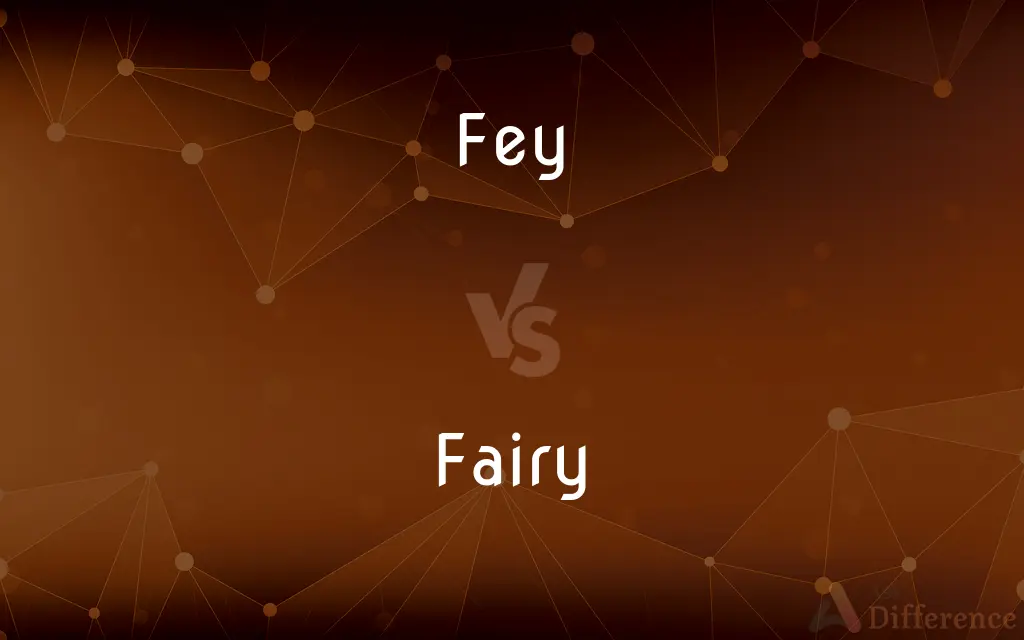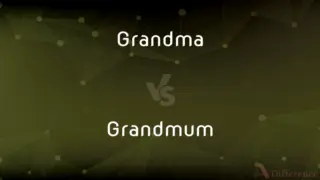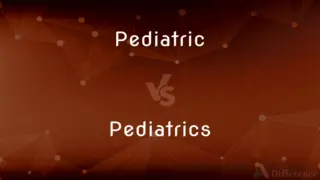Fey vs. Fairy — What's the Difference?
By Tayyaba Rehman — Updated on November 7, 2023
"Fey" refers to having a mystical or fairy-like quality, often linked with the supernatural, while "Fairy" denotes a mythical creature with magical abilities.

Difference Between Fey and Fairy
Table of Contents
ADVERTISEMENT
Key Differences
Fey, originating from Middle English, often refers to a supernatural or unreal quality, sometimes linked to doom or clairvoyance. Fairies are mythical creatures from folklore, small in stature with magical powers and often depicted with wings. While "fey" can describe a person or an action that seems whimsically odd or otherworldly, "fairy" specifically refers to an entity. Fey is an adjective describing an eerie or strange aura, while fairy is a noun.
"Fey" can imply an impression of vague unworldliness, even a premonition of death, whereas a "fairy" is a whimsical, often benevolent figure in myth. A fey person might be seen as eccentric, slightly out of touch with the mundane world, perhaps with a disquieting beauty or odd mannerism. In contrast, fairies are often involved in mischief or benevolence, with a cultural background rich in storytelling tradition.
To be described as fey is to be seen as having an otherworldly, fairy-like quality, but not actually being a fairy. In literature, fairy characters have distinct personalities and roles within their stories, often engaging with humans or other mythical beings. Someone might exhibit a fey personality or aspect, yet fairies themselves are fantastical beings that embody the magic and mystery of their own realm.
Comparison Chart
Definition
Otherworldly or mystical quality.
A mythical, magical creature.
Part of Speech
Adjective.
Noun.
ADVERTISEMENT
Usage
Describes a person, aura, or characteristic.
Refers to the being itself.
Connotation
Can imply foreboding or eccentricity.
Often whimsical, enchanting, or mischievous.
Origin
Middle English “feyge,” meaning fated to die.
Old French “faerie,” realm of the fays.
Compare with Definitions
Fey
Mystically foreboding
There was a fey light in her eyes that night.
Fairy
Symbol of magic
Fairies in her stories symbolize nature's whimsy.
Fey
Otherworldly
His fey presence was unsettling to others.
Fairy
Mythical being with magic
The fairy granted her three wishes.
Fey
Whimsically strange
The artist's fey creations attracted a niche following.
Fairy
Legendary figure
Children left letters for the tooth fairy.
Fey
Eccentric
She had a fey way about her that intrigued everyone.
Fairy
Enchanted realm inhabitant
A fairy appeared at the edge of the enchanted forest.
Fey
Overrefined, exaggerated, or affected
"She said the word in a deliberately fey and pretentious manner, striking a pose" (Jenefer Shute).
Fairy
Tiny enchanted creature
He painted a fairy sitting on a toadstool.
Fey
Effeminate
"a fey snap of the wrist" (Michael Eric Dyson).
Fairy
A fairy (also fay, fae, fey, fair folk, or faerie) is a type of mythical being or legendary creature found in the folklore of multiple European cultures (including Celtic, Slavic, German, English, and French folklore), a form of spirit, often described as metaphysical, supernatural, or preternatural. Myths and stories about fairies do not have a single origin, but are rather a collection of folk beliefs from disparate sources.
Fey
Having or displaying an otherworldly, magical, or fairylike aspect or quality
"She's got that fey look as though she's had breakfast with a leprechaun" (Dorothy Burnham).
Fairy
A small imaginary being of human form that has magical powers, especially a female one
Fairy gold
She believed she had had fairies at the bottom of her garden
Fey
Having visionary power; clairvoyant.
Fairy
A Central and South American hummingbird with a green back and long tail.
Fey
Appearing touched or crazy, as if under a spell.
Fairy
A male homosexual.
Fey
Fated to die soon.
Fairy
An imaginary being in human form, depicted as clever, mischievous, and possessing magical powers.
Fey
Full of the sense of approaching death.
Fairy
Offensive Slang Used as a disparaging term for a gay man.
Fey
About to die; doomed; on the verge of sudden or violent death.
Fairy
The realm of faerie; enchantment, illusion.
Fey
(obsolete) Dying; dead.
Fairy
A mythical being with magical powers, known in many sizes and descriptions, although often depicted in modern illustrations only as a small sprite with gauze-like wings, and revered in some modern forms of paganism.
Fey
Possessing second sight, clairvoyance, or clairaudience.
Fairy
An enchantress, or creature of overpowering charm.
Fey
Overrefined, affected.
Fairy
A male homosexual, especially one who is effeminate.
Fey
Strange or otherworldly.
Fairy
A member of two species of hummingbird in the genus Heliothryx.
Fey
Spellbound.
Fairy
A legendary Chinese immortal.
Fey
Magical or fairylike.
Fairy
Like a fairy; fanciful, whimsical, delicate.
Fey
Fairy folk collectively.
Fairy
Enchantment; illusion.
The God of her has made an end,And fro this worlde's fairyHath taken her into company.
Fey
Fated; doomed.
Fairy
The country of the fays; land of illusions.
He [Arthur] is a king y-crowned in Fairy.
Fey
Faith.
Fairy
An imaginary supernatural being or spirit, supposed to assume a human form (usually diminutive), either male or female, and to meddle for good or evil in the affairs of mankind; a fay. See Elf, and Demon.
The fourth kind of spirit [is] called the Fairy.
And now about the caldron sing,Like elves and fairies in a ring.
Fey
To cleanse; to clean out.
Fairy
An enchantress.
No goblin or swart fairy of the mineHath hurtful power over true virginity.
Fey
Slightly insane
Fairy
Of or pertaining to fairies.
Fey
Suggestive of an elf in strangeness and otherworldliness;
Thunderbolts quivered with elfin flares of heat lightning
The fey quality was there, the ability to see the moon at midday
Fairy
Given by fairies; as, fairy money.
Fey
Implying clairvoyance
He had a fey understanding of events yet to unfold.
Fairy
Small, human in form, playful, having magical powers
Fairy
Offensive terms for an openly homosexual man
Common Curiosities
Can "fey" describe actual fairies?
It describes qualities that one might associate with fairies but not the beings themselves.
Are all fairies depicted as good?
Fairies in folklore can range from benevolent to mischievous or even malevolent.
Is "fey" always related to fairies?
No, it describes a quality that is whimsical or otherworldly.
Does "fey" have a negative connotation?
It can imply something strange or predestined, not necessarily negative.
Can a person be called a fairy?
It's generally used to refer to mythical beings, not real people.
Do fairies always have wings?
While often depicted with wings, not all fairy representations have them.
Is "fey" related to fate?
Historically, it has connections to fate, especially concerning death or doom.
Does "fey" have roots in specific folklore?
Its roots are in European folklore where it often indicated an ominous destiny.
Is "fey" used in modern language?
It's less common but still used to describe a particular otherworldly quality.
Are fairies part of a particular culture?
Fairy myths are found in various cultures worldwide with different characteristics.
Can "fey" refer to supernatural abilities?
It can imply an unnatural or preternatural understanding or ability.
Is "fairy" ever used as an adjective?
Rarely, but "fairy-like" is more common when describing something as reminiscent of a fairy.
Can "fey" be used positively?
Yes, when referring to someone's whimsical or enchanting nature.
Are fairies considered part of the natural world?
In many traditions, fairies are deeply connected to nature and natural forces.
Do children believe in fairies?
Many children's stories and traditions encourage belief in fairies.
Share Your Discovery

Previous Comparison
Grandma vs. Grandmum
Next Comparison
Pediatric vs. PediatricsAuthor Spotlight
Written by
Tayyaba RehmanTayyaba Rehman is a distinguished writer, currently serving as a primary contributor to askdifference.com. As a researcher in semantics and etymology, Tayyaba's passion for the complexity of languages and their distinctions has found a perfect home on the platform. Tayyaba delves into the intricacies of language, distinguishing between commonly confused words and phrases, thereby providing clarity for readers worldwide.















































